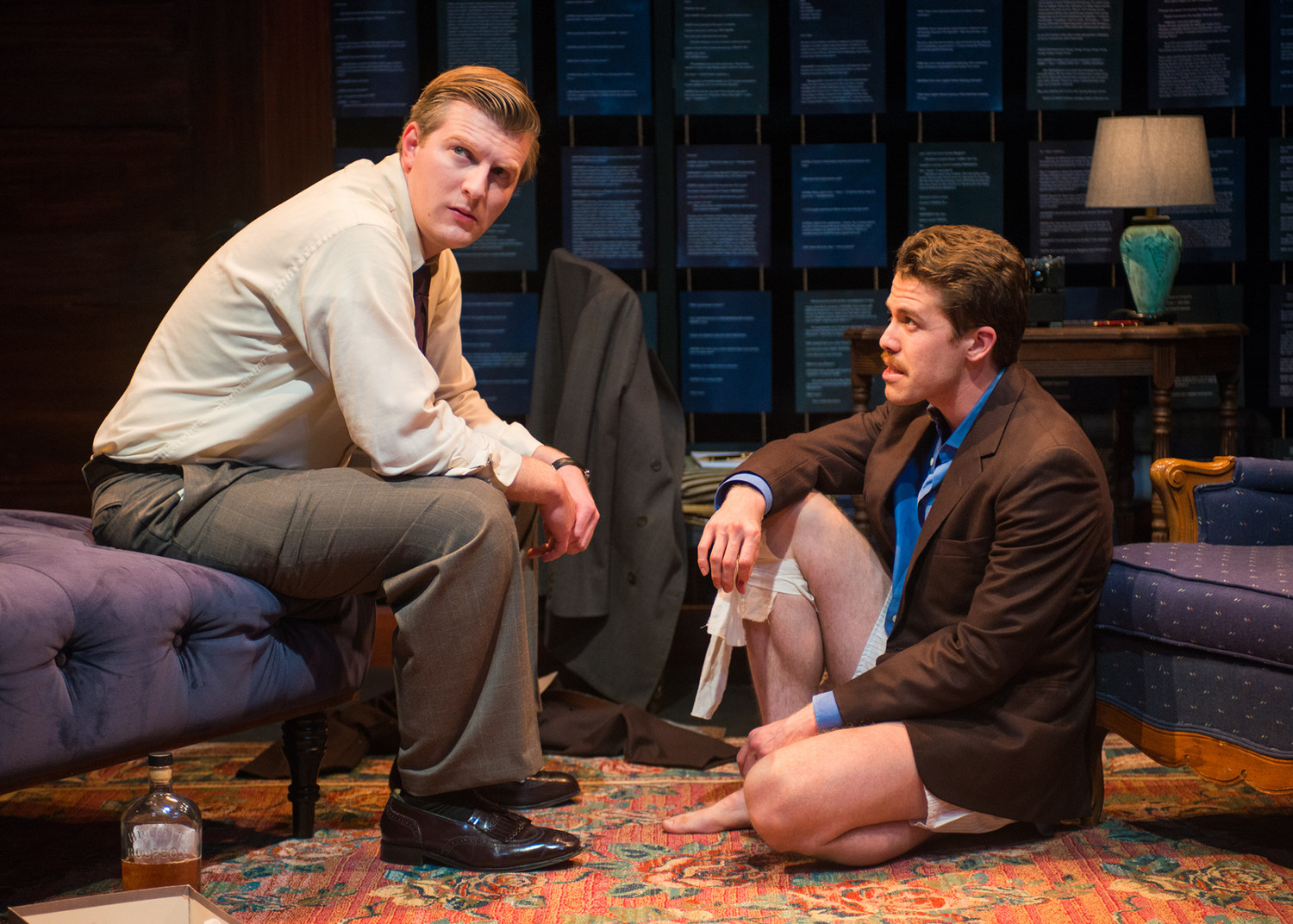Review: THE GENTLEMAN CALLER at New Conservatory Theatre Center is a poignant, intimate meeting between two literary giants- Tennessee Williams and William Inge.

Themes of sexual repression and expression and the role of the homosexual artist are brilliantly explored in Philip Dawkin's intimate conversations between literary giants Tennessee Williams and William Inge in The Gentleman Caller. Over the course of two liquor-drenched evenings in 1944, these two young men who would go on to change the face of theatre air their deepest thoughts on their tortured upbringings and how it manifests itself in their sexual proclivities. Dawkins, an out rising star playwright, has written a dazzling script, that while imagined, seems like we're intruding on the private conversations of the participants.
It's November 1944 and Tennessee Williams is visiting family in St. Louis and putting finishing touches on his play The Gentleman Caller soon to open in Chicago. While in town he's eager to get some positive press through an interview with William Inge, drama critic at the St. Louis Star-Times. Dawkins breaks the fourth wall by having Williams provide exposition to the proceeding, a device that allows the audience to be voyeurs to the intimacies to come.
Williams sets the atmosphere of Inge's dark, secluded man-cave where the action of Act One occurs. Dark mahogany woodwork and black tiled wall coverings made of script pages from Cat on a Hot Tin Roof gives the feel of a stately men's club in Kevin Landesman's set design. Inge receives his guest and the two begin a cat and mouse game that clearly illuminates both men's sexual positions. Inge is awkward, anxious and deeply in the closet. Williams is smooth as the ice he peppers his liquor with, openly gay and self-confident.

After few minutes of polite chit chat and witty banter by Williams, Inge throws him on the settee in a failed attempt to bugger Williams. It's totally unexpected but illustrates Inge's sexual repression and attempt at exerting his power over the 'bitch' Williams. Thus begins the examination of these two men visions of the artist, one stifled by his fears, the other willing to express those fears through his work and exorcising them.
Dawkins has done his research, accurately scripting Williams wit and genius. Like an acerbic, gay Will Rogers, Williams provides the humor in the play - self-effacing for sure, but full of the realism of being out in a world that despised and reviled him. In Inge, Williams sees the potential ready to be released, a coming out story all LGBTQ people can empathize.
This great two-hander script is elevated by Catricala's smart casting. Adam Niemann (Reefer Madness, Isaac's Eye), makes his NCTC debut as Inge, and creates a character so conflicted and confused that I felt anxious watching him. Full of facial ticks and looking to the sky to avoid intimacy and contact, Niemann is a heartbreaking creature dying for comfort. He both loathes and idolizes Williams and beautifully captures the ugly effects of the repressed gay man.
%20and%20William%20Inge%20(Adam%20Niemann)%20spy%20on%20the%20neighbors_%20Photo%20by%20Lois%20Tema_%20(3).jpg/Picture%20L%20to%20R-%20Tennessee%20Williams%20(Brennan%20Pickman-Thoon)%20and%20William%20Inge%20(Adam%20Niemann)%20spy%20on%20the%20neighbors_%20Photo%20by%20Lois%20Tema_%20(3)__448x320.jpg)
Williams, also a tortured soul, chooses to confront societies failure to deal with sensitivity. He's more than willing to destroy himself fashionably to advance the arts. The unlikely hero of the tale is played by the exquisitely talented Brennan Pickman-Thoon who wowed this critic in Timon of Athens and Phedre. Comfortable with Shakespeare, Brennan delivers Williams' intelligent and oft naughty dialogue with a leisurely Southern drawl and rhythm that balances Inge's frenetic energy with a confident calm. It's another star turn by one of the Bay Area's finest actors.
The second act takes place in a seedy Chicago hotel room after the opening of Williams play, now re-titled The Glass Menagerie. Liquor plays heavily in the play, perhaps a device to open the characters to reveal their innermost thoughts and desires. The two once again flirt awkwardly, with Inge unable to consummate any real commitment. There's a confrontation over each other's authenticity and a sweet moment where Williams acknowledges the potential in a manuscript Inge has written.
Both men would go onto to great success. Williams would have hits with Menagerie, A Streetcar Named Desire and Cat on a Hot Tin Roof. Inge would have hist with Farther Up from Heaven (re-worked as Dark at the Top of the Stairs), win a Pulitzer for Picnic, and Bus Stop. Their huge successes would drive a jealous wedge between the two giants and they both died young, sad, untimely deaths.
In his denouement speech, Williams delivers one of the most important messages of the play - that although at their most powerless, these two gay men contributed to the culture of their time in an immense way. That contribution, their own literary and social butterfly effect, ripples through time to this very day. Bravo to Artistic Director Ed Decker for bringing Dawkin's brave and sensitive passion play to life.
The Gentleman Caller continues through May 5th, 2019 at New Conservatory Theatre Center, 25 Van Ness Avenue, CA. Tickets are available at www.nctcsf.org or by calling (415) 861-8972.
Photos by Lois Tema.
Videos

